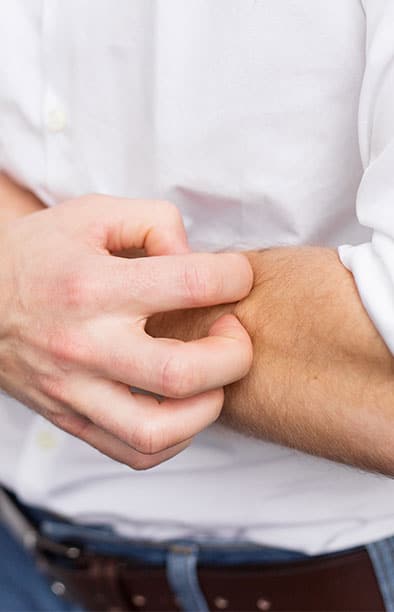What is Eczema Treatment?
Eczema treatment is a solution to uncomfortable eczema symptoms in patients of all ages. Narrow band ultraviolet light is used to help reduce symptoms, without the side-effects of other eczema treatment options. Topical medications are another option which can help alleviate symptoms.
I’ve been a patient here for about 4 years, and I couldn’t be more pleased. The staff is really nice, and appointments are 90% on time, and the doctor is really great. He doesn’t over prescribe/offer unneeded treatments, and he is really just a nice guy. 10/10, 100% recommended.”
Who is a Candidate for Eczema Treatment?
Any individual with eczema may benefit from this treatment option. There are multiple types of eczema that can come in waves lasting for a short period of time, or be long-lasting. Common symptoms of eczema include:
- Swollen, red, and scaly skin
- Itchy skin
- Rough, leathery patches of skin
- Dark colored patches of skin
- Areas of swelling
A consultation with Dr. Baird can help to discuss your symptoms, the types of skincare products you use, and family history to best determine if this treatment is right for you.
How to Prevent Eczema Flare Ups
Eczema is often a lifelong condition, but certain things can make eczema worse and flare up. Meeting with Dr. Baird is important to determine your personal triggers and how you can best avoid them. Common eczema triggers include:
- Food allergies
- Mold, pollen, and airborne allergens
- Certain metals, chemicals, cosmetics, and materials found in products
- Harsh soaps and detergents
- Rough fabrics
- Stress
- Extreme temperatures
- Humidity
- Sweating
- Skin infections
- And more
On Our Blog:
6 Tips for Treating Eczema This Winter
Treatments for Eczema
Eczema often requires a multifaceted approach to treatment. Treatments for eczema are focused around managing symptoms since eczema cannot currently be cured. Dr. Baird may recommend a combination approach to treating symptoms combined with learning and avoiding your specific triggers.
Topical Therapies
For more severe eczema, topical steroids may be prescribed to treat skin inflammation and promote healing of cracked skin. Steroid creams can often reduce the impact of flare ups after they have occurred. Dr. Baird may also recommend over-the-counter (OTC) hydrocortisone to treat itchiness.
UV Light Therapy
Eczema is treated in Farmington Hills using narrow band ultraviolet light. Treatment is done in office and does not require any type of anesthesia. During treatment, patients will stand inside a special light box which emits UVB light. This type of light helps to reduce symptoms of eczema, including itching and inflammation, as well as increase vitamin D production and increase bacteria-fighting systems in the skin.
Before Your Eczema Treatment
Dr. Baird will take a detailed medical history and spend extensive time discussing your possible triggers and past treatments with eczema, including topical medications. He will develop a personalized treatment plan and explain the benefits of each option. If you choose to be treated with UV light therapy, you will develop an appropriate calendar of treatments for best results.
Recovery After Eczema Treatment
There is no downtime associated with narrow band ultraviolet light treatments. Patients commonly require 2-3 treatments per week to see effective results. After several months of treatment, frequency of visits can often be reduced. Some patients may experience a remission of their eczema with a halt to symptoms.
Eczema Treatment in Farmington Hills, MI
Eczema treatment can help to relieve symptoms in patients of all ages. If you or a loved one are interested in treatments, contact our Farmington Hills office today to schedule an appointment.


